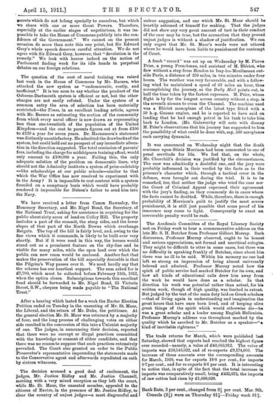The question of the cost of naval training was raised
last week in the House of Commons by Mr. Barnes, who attacked the new system as " undemocratic, costly, and inefficient." It is too soon to say whether the product of the Osborne-Dartmouth system is efficient or not, but the other charges are not easily refuted. Under the system of a common entry the area of selection has been materially restricted—the Times, in an excellent leading article, agrees with Mr. Barnes as estimating the section of the community from which every naval officer is now drawn as representing less than one-twentieth of the population of the United Kingdom—and the cost to parents figures out at from £100 to £120 a year for seven years. Dr. Macnamara's statement was distinctly unsatisfactory. He admitted the drawbacks of the system, but could hold out no prospect of any immediate altera- tion in the direction suggested. The total remission of parents' fees, including the charge for midshipmen training afloat, would only amount to £100,000 a year. Failing this, the only adequate solution of the problem on democratic lines, why should not the Admiralty institute a system of prize-cadetship
scholarships at our public schools—similar to that which the War Office has now resolved to experiment with in the Army ? It is impossible to rest content with a system founded on a sumptuary basis which would have probably rendered it impossible for Nelson's father to send him into the Navy.




































 Previous page
Previous page